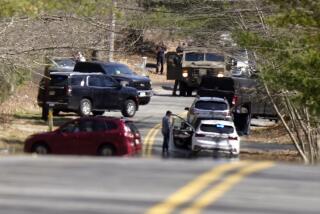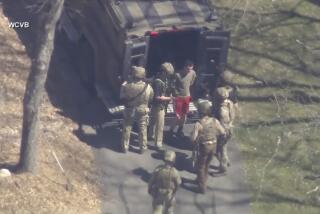Iraq Got U.S. Technology After CIA Warned Baker : Weapons: Despite the notice about Baghdad’s nuclear efforts, secretary said exports would not be curtailed.
- Share via
WASHINGTON — The CIA warned Secretary of State James A. Baker III in a September, 1989, top-secret assessment that Iraq was developing a “nuclear weapons capability,” and the agency identified the specific technology being sought by Baghdad, according to classified documents.
Nevertheless, a month later, Baker assured Iraq’s foreign minister that the Bush Administration had no plans to tighten controls on technology exports to Iraq.
That November, Baker played a decisive role in approving an additional $1 billion in U.S. food aid for Baghdad--despite another warning that federal prosecutors were investigating allegations that Iraq may have used earlier aid to acquire nuclear-weapons technology.
The CIA analysis was one of numerous intelligence reports to Baker and other senior Bush Administration officials detailing the activities of Iraq’s clandestine worldwide arms-procurement network, according to records obtained by The Times.
The newly disclosed documents demonstrate that the intelligence reports were transmitted to the highest levels of the Administration. Yet officials declined to impose restrictions or take other measures that might have slowed Iraq’s efforts to develop a nuclear weapon.
The new documents also provide additional evidence of the extent of the Administration’s knowledge of Iraq’s arms procurement efforts in the years before the invasion of Kuwait.
State Department spokeswoman Margaret Tutwiler, traveling with Baker in the Middle East, declined to respond to questions about the CIA analysis.
“We are going to follow the same policy on this story as we have on the past ones, which is not to get into all the specifics or try to interpret documents that were made available,” Tutwiler said. “Secretary Baker and others have talked about prewar policy. We’ve testified on it; we’ve released documents publicly, and we’ve released them (documents) to the Congress.”
Classified documents previously disclosed by The Times already have shown that the Administration was warned repeatedly, starting as early as 1985, by its own intelligence agencies that Iraq was developing nuclear, chemical and biological weapons, possibly with diverted U.S. technology.
Post-Persian Gulf War inspections by the United Nations have demonstrated that U.S. technology was used in Iraq’s weapons programs. Allegations that U.S. food aid was diverted to buy weapons are still under federal investigation.
Paradoxically, at the start of the Gulf War, President Bush invoked Iraq’s potential to develop and deploy nuclear weapons as one reason for launching the air war instead of continuing economic sanctions.
“We are determined to knock out Saddam Hussein’s nuclear bomb potential,” Bush told the nation in a televised address on Jan. 16, 1991.
Confronted with questions about prewar assistance to Iraq in recent weeks, the President has denied repeatedly and categorically that his Administration provided any help in Baghdad’s drive to develop nuclear, chemical or biological weapons.
Classified records have shown that the Administration resisted efforts to curtail sales of sensitive technology to Iraq as late as May, 1990, two months before the invasion.
In the CIA assessment dated Sept. 3, 1989, Baker and other officials were informed that Iraq was developing a nuclear weapon to “counter perceived military threats from Israel and Iran.” Iraq’s front companies had “made extensive use of covert techniques in Western Europe” to obtain high-tech goods vital to its nuclear weapons program, the report said.
Technology identified by the CIA included high-speed cameras, oscilloscopes and sophisticated computers. Records show that the Administration allowed such technology to go to Iraq even after the warnings, continuing a policy begun as part of the Ronald Reagan Administration’s attempt to influence Iraqi President Hussein.
On Oct. 6, 1989, Baker met with Iraqi Foreign Minister Tarik Aziz in Washington. Minutes of the meeting show that Baker stressed the Administration’s desire for strong ties to Baghdad and said it opposed attempts by Congress to impose sanctions on Iraq.
“Regarding technology, the secretary admitted that the U.S. does have concerns about proliferation but they are worldwide concerns,” the minutes said. “He suggested that we work together on specific requests so the U.S. can understand Iraqi needs and objectives and Iraq can hear what concerns us.”
At the meeting, Aziz raised concerns about alleged efforts by the United States to destabilize the Iraqi government. On Oct. 21, 1989, Baker sent a classified cable to Aziz in which he said that he has discussed the matter with Bush and that there was no such U.S. effort.
“Such an action would be completely contrary to the President’s policy, which is to work to strengthen the relationship between the United States and Iraq whenever possible,” according to a copy of the cable.
An examination of records of the interagency Administration group that reviews exports of technology with potential nuclear weapons uses found that substantial amounts of such goods were licensed for sale to Iraq.
Between 1985 and 1990, the Reagan and Bush administrations approved 410 licenses to Iraq for goods with potential nuclear applications, while disapproving 116, records show.
Congressional and federal investigators now say they have uncovered evidence that one element of Iraq’s procurement network, a Cleveland machine-tool company called Matrix Churchill, obtained tens of millions of dollars in U.S. technology for Iraq’s nuclear program.
Matrix Churchill was not shut down by the Customs Service until the month after Iraq’s invasion of Kuwait, despite intelligence reports dating back to the summer of 1989 that identified its British parent, also known as Matrix Churchill, as part of the worldwide procurement network.
Intelligence warnings also came as the Administration was considering new loan guarantees for Iraq.
“Baghdad has created a complex procurement network of holding companies in Western Europe to acquire technology for its chemical, biological, nuclear and ballistic missile program,” said a Nov. 6, 1989, secret CIA report naming Matrix Churchill and numerous other fronts.
Two days later, the Administration approved the additional $1 billion in loan guarantees for Iraq from the Commodity Credit Corp. over objections of four federal agencies worried about Iraq’s credit-worthiness and the allegations of aid diversion.
The approval followed personal lobbying by Baker and top aides. Records show that, along with the September CIA report, Baker also had received another classified report about that time that raised suspicions about possible diversion of U.S. aid.
The report said federal prosecutors were investigating “allegations of widespread and blatant ‘irregularities’ in the CCC program for Iraq.” Among the allegations was possible “diversion and transshipment of commodities outside Iraq” for arms purchases.
Three of Baker’s top aides were warned that investigators believed “that diverted funds were used to procure nuclear related equipment” and that Matrix Churchill was “involved in supplying military hardware to Iraq.”
The warnings continued. Two weeks later, a State Department memo said intelligence information indicated that Iraq was pursuing “a nuclear explosive capability” with the assistance of Iraq’s clandestine network.
Although the memo warned that some U.S. high technology was diverted for Iraq’s nuclear program, it argued that Administration policy was to “improve relations with Iraq, including trade, which means . . . exports of dual-use commodities for conventional military use may be approved.” The memo also charged that licensing policy was holding back exports to Iraq.
In mid-February of 1990, U.S. diplomats in nine foreign capitals were instructed to express concerns about Iran’s and Iraq’s nuclear programs. The diplomats were to urge the “host governments not to provide either Iran or Iraq with ‘plutonium or highly enriched uranium’ ” to make a bomb and, more important, were “cautioned against the export of so-called ‘dual-use’ items to the nuclear programs of Iran or Iraq.”
But contrary to the advice given U.S. allies, senior Bush Administration officials continued to press for relaxation of U.S. export licenses that might assist Iraq’s nuclear program.
In March, 1990, John Kelly, then an assistant secretary of state who also had received the September, 1989, CIA warning, complained that the interagency licensing policy was still holding up export licenses to Iraq. “We have explicit presidential authority for expanding trade with Iraq,” Kelly said.
On March 27, 1990, U.S. and British customs agents thwarted an effort by Iraq to obtain American-made triggers for nuclear weapons.
Within days, a State Department official warned in a classified memo that the incident was “another indication that Iraq may be seeking to develop a nuclear weapons option. Although this does not appear to be a danger in the near term because Iraq lacks facilities to produce weapons-grade nuclear materials . . . it is important to try and prevent Iraq from acquiring sensitive technologies at an early stage.”
A senior State Department official was being dispatched to France, West Germany, Belgium and other countries to brief foreign leaders on “Iraq’s nuclear program and procurement activities” and argue for “the need to control exports of sensitive nuclear and missile technology to Iraq,” according to the memo.
But in May and June of 1990, according to classified documents, the National Security Council rejected proposals by the Commerce Department to tighten the export licensing of U.S. technology to Iraq.
More to Read
Sign up for Essential California
The most important California stories and recommendations in your inbox every morning.
You may occasionally receive promotional content from the Los Angeles Times.












